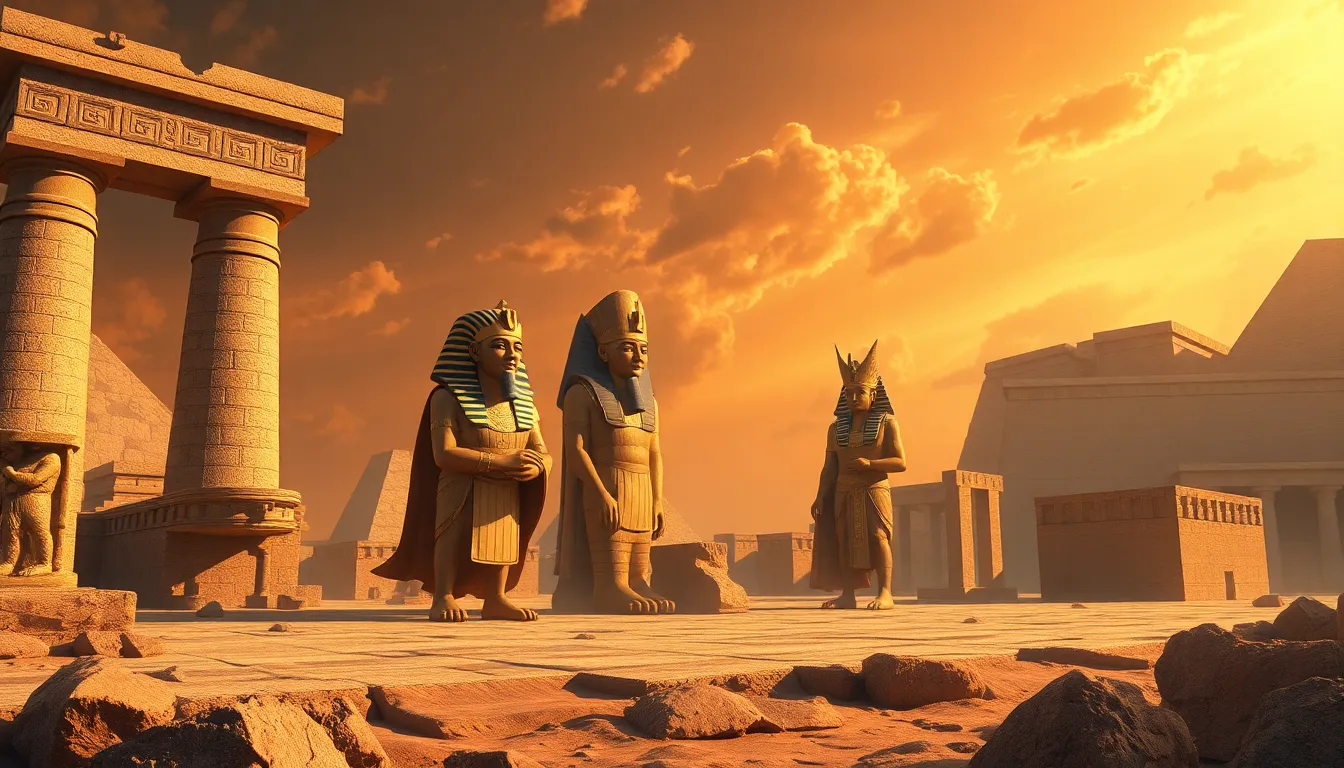The Divine Right to Rule: Pharaohs and Their Decrees
I. Introduction
The concept of Divine Right to Rule is a doctrine that asserts that a monarch derives the right to rule directly from the will of God, rather than from the consent of the people. In ancient Egypt, this principle was embodied in the figure of the pharaoh, who was not only a political leader but also a divine being in the eyes of his subjects. The pharaohs held immense significance in ancient Egyptian society, serving as intermediaries between the gods and the people, which legitimized their authority and decrees.
This article aims to explore the divine authority of pharaohs and the nature of their decrees, shedding light on how this ancient civilization structured its governance and societal norms around the concept of divine kingship.
II. Historical Context of Egyptian Pharaohs
The emergence of pharaohs can be traced back to the early dynastic period of Egyptian civilization, around 3100 BCE. These rulers unified Upper and Lower Egypt, establishing a centralized state that would last for millennia. The political and social structure of ancient Egypt was hierarchical, with the pharaoh at the top, followed by nobles, priests, and common people.
Religion played a crucial role in legitimizing pharaonic authority. The Egyptians believed that the pharaoh was the embodiment of the god Horus on earth and that upon death, he would become one with Osiris, the god of the afterlife. This divine connection was essential for maintaining the pharaoh’s status and the stability of the kingdom.
III. The Theology of Kingship
The theology of kingship in ancient Egypt posited the pharaoh as a living god. This belief was deeply ingrained in the culture and governance of the time. The pharaoh was seen as the protector of Ma’at, the principle of truth, balance, and cosmic order.
The connection between gods and the pharaoh’s authority was reinforced through various rituals and ceremonies. These included:
- Coronation Ceremonies: Symbolizing the pharaoh’s divine right to rule.
- Horus and Seth Rituals: Enacting the mythological struggle for kingship.
- Funerary Practices: Ensuring the pharaoh’s safe passage to the afterlife and reaffirming his divine status.
IV. Decrees and Edicts of the Pharaohs
The decrees issued by pharaohs were diverse and often influenced all aspects of life in ancient Egypt. These included:
- Laws: Establishing rules for behavior and governance.
- Construction Projects: Directing monumental works like temples and pyramids.
- Taxation Edicts: Regulating the collection of taxes to support the state.
One of the most significant case studies is the decrees related to the construction of the pyramids. Pharaohs like Khufu commissioned these massive projects, which required immense resources and labor. The impact of these decrees was profound, as they not only demonstrated the pharaoh’s power but also provided employment and structured society around a shared goal.
V. The Role of Advisors and Officials
Supporting the pharaoh’s authority was a complex bureaucratic system. The vizier, often considered the second-in-command, played a crucial role in the administration of the kingdom. Responsibilities included:
- Overseeing the collection of taxes.
- Managing state projects and resources.
- Advising the pharaoh on matters of governance and policy.
This balance of divine rule with practical governance ensured that the pharaoh’s decrees could be effectively implemented, maintaining order and stability within the kingdom.
VI. Challenges to Pharaonic Authority
Despite their divine right, pharaohs faced numerous challenges to their authority. Internal conflicts often arose from rival claims to power, leading to periods of instability. Additionally, external threats from neighboring civilizations, such as the Nubians and the Libyans, tested the pharaoh’s strength and legitimacy.
Pharaohs responded to these challenges by:
- Strengthening military defenses.
- Engaging in diplomatic relations and marriages.
- Reinforcing their divine status through public displays of power.
VII. The Legacy of the Pharaohs’ Divine Right
The concept of divine right as practiced by the pharaohs has had a lasting influence on later political systems. Monarchies throughout history have drawn on similar principles to justify their rule. Moreover, the fascination with pharaonic authority continues in contemporary culture, evident in literature, film, and art.
Modern governance can also learn from the ancient Egyptians’ integration of religion and politics. The lessons drawn from the pharaohs’ divine right highlight the importance of legitimacy, whether through tradition, religion, or public support.
VIII. Conclusion
In summary, the divine right to rule in ancient Egypt was a fundamental aspect of pharaonic authority, shaping the political and social landscape of the civilization. The interplay between religion and governance not only legitimized the pharaohs’ decrees but also ensured the stability of the kingdom. Understanding this concept is crucial in appreciating the complexities of ancient Egyptian society and its enduring legacy in the modern world.
Through exploring the divine right of pharaohs, we gain insights into the dynamics of power, authority, and the significant role of beliefs in shaping governance throughout history.




